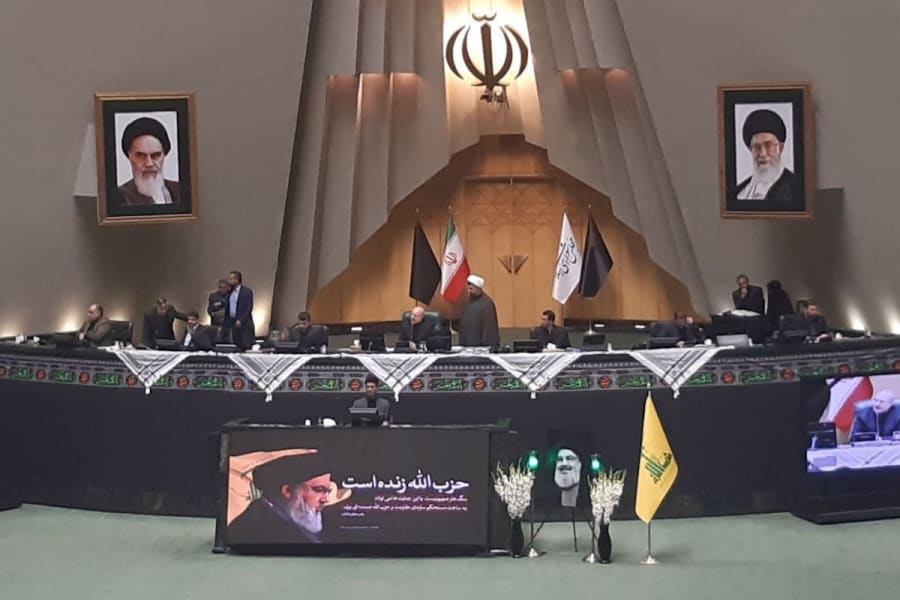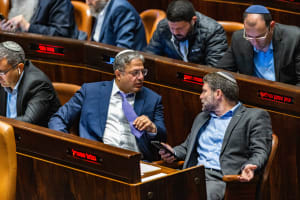Spider web, chessboard and Iran: What's Tehran's next move?
Iran's immediate responses have been measured, reflecting a careful calibration of its options

This is not how Iran planned things to unfold. The past few months were supposed to be a chokehold of a brilliant checkmate, revealing the first steps of Israel’s long-awaited defeat, but instead, recent events –particularly the targeted strike against Hezbollah's leadership in Lebanon, including the elimination of Hezbollah’s leader, Hassan Nasrallah – have prompted a significant reassessment of Iran's strategic position in the region.
Operation New Order, striking at the heart of one of Iran's key proxies, has introduced a new level of unpredictability into the already complex Middle Eastern geopolitical landscape.
Iran's immediate responses have been measured, reflecting a careful calibration of its options. Public statements from Iranian officials have been notably restrained, with Iranian Supreme Leader Ali Khamenei emphasizing solidarity with Hezbollah while stopping short of calling for immediate retaliation. A very different approach than what we’ve seen from Iran in recent months. This cautious approach suggests ongoing internal deliberations about the most appropriate course of action.
The relocation of Ayatollah Khamenei to a more secure location underscores the Iranian regime's concern about its vulnerability to Israeli strikes. This fear of further escalation has created a situation where Iran must carefully weigh its options, balancing the need to maintain its deterrence credibility with the risk of provoking additional Israeli actions.
Iran's Strategic Dilemma
1. Reassessment of the "Spider Web" Theory: Iran's traditional view of Israel as a fragile society, vulnerable to sustained pressure, is being challenged. The recent operation showcases Israel's resilience and offensive capabilities, forcing Iran to reevaluate its long-term strategy of attrition against Israel.
2. Proxy Warfare Strategy Under Scrutiny: The effectiveness of Iran's proxy warfare approach, a cornerstone of its asymmetric strategy, is now in question. The strike against Hezbollah leadership demonstrates the vulnerability of even well-established proxy groups, potentially compromising Iran's ability to project power and maintain plausible deniability in regional conflicts.
3. Nuclear Program Calculations: Iran's nuclear ambitions remain a central factor in its strategic thinking. The current situation may accelerate Iran's nuclear program as a deterrent, but it also increases the risk of preemptive action against nuclear facilities. This delicate balance is further complicated by ongoing negotiations with Western powers over the nuclear issue.
4. Domestic and Ideological Considerations: Iran's response must also consider internal dynamics. The regime's legitimacy is partly built on its image as a bulwark against Israel and Western influence. A perceived weak response could undermine this narrative, potentially fueling domestic dissent.
5. Regional Leadership Aspirations: Iran's claim to leadership in the Shiite world and broader Muslim community is at stake. The assassination of a figure as significant as Nasrallah challenges Iran's ability to protect its allies and maintain its status as the center of the "Axis of Resistance."
6. Erosion of Deterrence: Iran's strategy of deterrence through proxy warfare and the threat of retaliation has been significantly undermined. The assassination demonstrates that Israel is willing to accept the risks associated with striking key Iranian allies.
7. Internal Power Dynamics: As reported, there are divergent views within Iran's power structure on how to respond. Hardliners call for swift retaliation, while moderates, including President Pezeshkian, warn against falling into what they perceive as an Israeli "trap" that could lead to a regional war.
8. Economic Constraints: Iran's struggling economy, burdened by sanctions and internal inefficiencies, limits its options for response. A major military confrontation could be economically disastrous, yet the cost of inaction in terms of lost prestige and influence is also significant.
9. Technological and Military Asymmetry: While Iran has made strides in missile technology and cyber capabilities, it still faces a significant technological gap with Israel, especially in areas like air defense and precision strike capabilities. This asymmetry influences Iran's calculus in considering direct confrontation.
Iran's Strategic Recalibration and Potential Next Moves
In light of these challenges, Iran is likely to pursue a multi-faceted approach that draws on historical precedents while adapting to the current geopolitical landscape.
Iran's new president, Masoud Pezeshkian, may spearhead a diplomatic charm offensive reminiscent of the country's approach after then-U.S. President Ronald Reagan's 1980 election, engaging in backdoor diplomacy with Western powers while presenting a more conciliatory face to ease tensions. Simultaneously, Iran is likely to maintain a low external profile, focusing on internal stability by strengthening domestic security, addressing economic challenges, and consolidating power within the regime. However, this apparent restraint may be accompanied by an intensification of covert operations through proxy networks and increased cyber warfare activities against Israeli and Western targets.
Despite potential diplomatic overtures, Iran might accelerate its nuclear program behind the scenes, viewing it as a crucial deterrent in an increasingly hostile environment. This dual approach of public negotiation and private advancement could serve as leverage in potential future talks. Concurrently, Iran may seek to strengthen its relationships with other regional powers, deepening ties with Russia and China for diplomatic and potentially military support, while engaging more closely with Turkey and Qatar to create a counterbalance to Israel and its allies.
The "Majnun" Option
Iran, on the other hand, could opt to employ the "majnun" strategy, a term that originates from the Arabic root word "jinn" (جن), referring to supernatural beings that are hidden or invisible. In modern usage, "majnun" describes an individual whose mind is perceived as being consumed by madness or possessed by external forces, implying a loss of rational control and an unpredictable nature. By embracing this approach, Iran would aim to project an image of unpredictability and danger, making it a force to be reckoned with in the region.
This would involve launching a significant, direct, and unprecedented attack on Israel, combined with coordinated strikes from its network of proxies that are still operational. Such an action would aim to demonstrate that Iran can "break the rulebook" even more dramatically than Israel, potentially involving:
A massive missile barrage from Iranian territory directly targeting Israeli cities and military installations.
Activation of Shiite militias in Iraq to strike Israeli or U.S. interests in the region.
Houthi forces in Yemen launching attacks on Israeli shipping or allies in the Red Sea.
Remnants of Hezbollah forces, along with Palestinian groups, initiating a multi-front assault on Israel's borders.
A blend of other covert tactics we haven’t seen before.
This high-risk strategy would aim to reset regional dynamics by showcasing Iran's willingness to escalate beyond expected norms, potentially deterring future actions against its interests. However, it would also risk full-scale war and international condemnation, testing the limits of support from allies like Russia and China.
Iran's leadership, long renowned for their strategic acumen akin to master chess players, now find themselves in an unprecedented predicament. They are forced to simultaneously navigate the intricate diplomacy of chess, the economic maneuvering of Monopoly, and the raw survival instincts of a good old-fashioned Middle Eastern street fight, where the rules are ‘Majnun’ and are being rewritten in real-time.

Tolik is a Middle East analyst and media professional with extensive experience in covering regional geopolitical developments. His background spans analytical journalism, media production, and strategic communications, having contributed to major Israeli and international television networks and newspapers.













